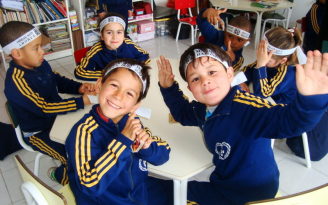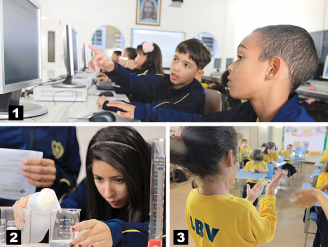
Seed of Fraternal Love
LBV of the USA promotes Culture of Peace and Solidarity in North American schools.
By the Editorial Staff
Monday | June 02, 2014 | 9:52 PM | Last update: September 22, 2016, 4:07 PM (Brasilia time)
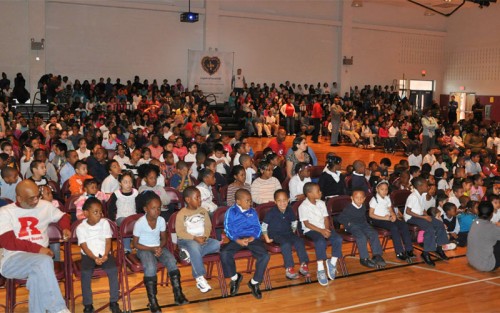
For more than six decades the Legion of Good Will has been investing in quality education. In order to achieve this, it allies its teaching practice with the values of Ecumenical Spirituality for the promotion of a Culture of Peace. This is the unique approach of the LBV, which enables children and young people to have the opportunity to develop themselves and become citizens aware of their social rights and duties. These values are found in the activities the Organization develops all over Brazil and in the six countries where it currently has autonomous bases (Argentina, Bolivia, Paraguay, Portugal, the United States, and Uruguay).
The LBV of the USA, for example, implements an important work through its Good Will Students for Peace program. “The action involves a partnership between educators from the Organization and with schools. One of the editions of this initiative took place in Lincoln Avenue School of Orange, New Jersey,” affirmed Sâmara Malaman, LBV’s program coordinator and educator. Over a period of three months, educators and students joined forces for a solidary cause: collecting food items and donating them to those in most need. At the same time, those involved learned more about Fraternal Love, Complete Charity, and Culture of Peace.
The outcome of the first edition of the program, in November 2013, was special for more than nine hundred students from Lincoln Avenue Elementary School. On this day, they watched a video that documented the actions carried out by the students themselves. “Everybody was happy to see their collaboration recognized. Furthermore, they were filled with good feelings,” remembered Danilo Parmegiani, representative of the LBV-USA.
Under the theme “Caring, Sharing, and Giving”, the LBV’s program sought to unite the proposal of solidary actions with the academic curricular content, aiming to encourage students to develop a more sensitive and critical view on the social reality that surrounds them and on the quality of interpersonal relationships. Naturally, they reflected on different ways of inspiring people to practice and promote ethical, fraternal, and spiritual values.
The action plan itself was defined by the students, who chose to organize a food drive to collect items for donation. The decision came after a research they carried out on the causes of homelessness and on the underprivileged communities in the region. As a result, they chose to help families living in Essex County, New Jersey.
To achieve the goal established, the students divided themselves into small teams, made a list of basic food items, and with the help of volunteers from the LBV, mobilized the local community to support the campaign. Thanks to the initiative, close to 60 food baskets were put together and distributed on November 28, Thanksgiving Day.
Reach and impact
By implementing the program, the LBV boosts the reach of this socio-educational action, which is aligned with at least five of the eight Millennium Development Goals (MDGs): eradicating extreme hunger and poverty; achieving universal primary education; promoting gender equality and empowering women; ensuring environmental sustainability; and working towards a global partnership for development.
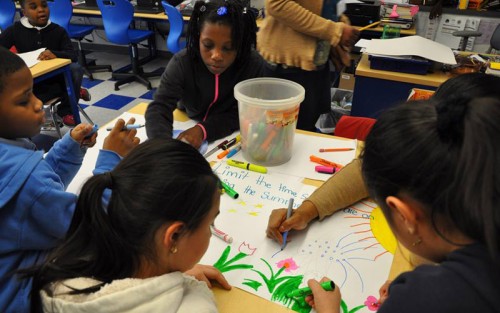
In the opinion of Cindy Varela, 2nd grade teacher, the initiative pleased the students and had a positive influence on their behavior: “Just watching them working in the community was enough to see that they were so happy to be helping. One of the students even said to you guys that he felt in his heart that he was doing a good job and that it made him feel good. I feel this is excellent for any school.”
The proposal of a teaching method that takes into account the role of feelings, affection, and compassion was praised by 2nd grade teacher Yashmine Cooper, who congratulated the LBV for its work. "If you introduce children to these values they’re going to act in accordance, without thinking twice. (...) It’s very important to expand this in education so we’re not limited just to the curriculum, but ready to develop [students’] characters, values, and morals, ” she said.
According to kindergarten teacher Hassan Shaheed , the work he develops with the students has, in his opinion, shown him the value of charitable feelings. “This program of the LBV is going to make children more aware of the world, to see what it’s really like, because sometimes in our homes we don’t see the situation of those who have nothing. (...) So I think it teaches children to become mindful of each other and it makes your heart so much bigger. When you give to others, it makes you feel so good inside."
Stages of the LBV program
The Good Will Students for Peace program is divided into the following phases: 1) obilization and engagement; 2) group activity development; and 3)results presentation and individual internalization. Its structure is based on the MAPREI (Learning Method through Rational-Emotional-Intuitive Research), the methodology of the Pedagogy of Affection (directed at children up to 10 years old) and the Ecumenical Citizen Pedagogy (for children starting at 11), which composes the educational proposal created by educator José de Paiva Netto, President of the LBV.
The representative of the LBV of the USA, Danilo Parmegiani, summed up the feeling of the educators involved in this first stage of the project: “One thing I know for sure: there’s a fertile field for planting the seed of Fraternal Love and reaping the pedagogical and human development benefits provided by the practice of Goodwill.”
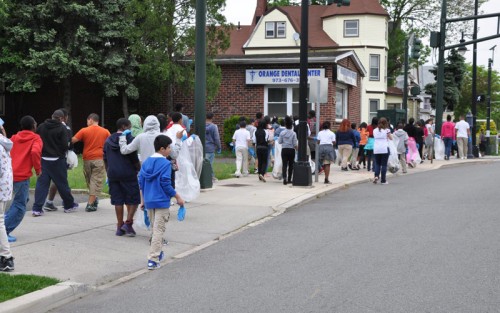
“In my classroom we put the Good Will Students for Peace program into practice every day,” said education specialist and kindergarten teacher Maria Albuquerque, who works with children aged 5 and 6 in New Jersey. “American teachers value the contribution of the LBV. They know that the Organization’s initiative seeks to encourage good attitudes, moral and ethical behavior, and actions in favor of those who are in need. In this way, both the school environment and the community are benefited.”
In the educator’s opinion, children are always willing to do something dynamic and different and the opportunity of doing good things is motivating for them. The result of this is that “they develop a greater understanding, a critical sense, and the conflicts are reduced.” There is, therefore, an actual change, particularly in the student’s behavior, according to Ms. Albuquerque.
The invitation to carry out a new activity in partnership with the Legion of Good Will, as well as the interest shown by other schools from New Jersey and New York in applying the program this year, is a recognition of the importance of this LBV’s socio-educational action, in the opinion of educator Sâmara Malaman. And she concluded: “Teachers, administrators, and psychologists from the school immediately saw the importance of how experiencing students to hands on character building activities would make them internalize the true message of Fraternal Love while building a conscience of solidarity within the students.”

